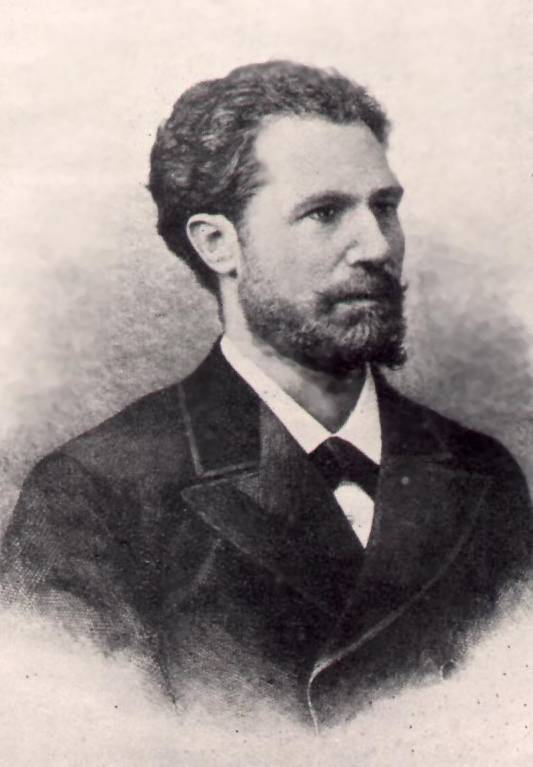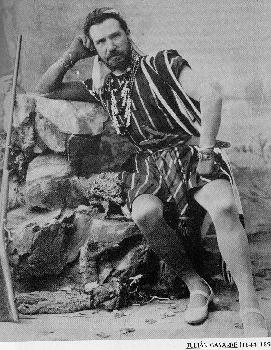Julián Gayarre
9 January 1844 Roncal – 2 January 1890 Madrid
I wish to thank Thomas Silverbörg for the picture.
From a very poor family, he left school at 13 and earned his life as a shepherd, then as a sales clerk in Pamplona, and eventually he learned the
trade of a blacksmith. When the Orfeon Pamplonés (a classical choir) was founded in 1865, Gayarre sang there in
his spare time. Choir director Joaquín Maya found the young man's voice promising, so he took him to Hilarión Eslava, famous
composer and director of the conservatory in Madrid. Eslava advised Gayarre to come to Madrid to study; Orfeon founder Conrado García
collected some money from patrons so as to make Gayarre's trip to Madrid feasible.
He studied voice at the Conservatorio Real, and appeared in 1867 in Tudela with the touring zarzuela company of Pepe Gainza, under a pseudonym
(Sebastián Sandoval). Without an engagement, he returned to Pamplona, and gave a concert (now as a soloist) with the Orfeon
Pamplonés (1868). He was so successful that a grant by the local authorities enabled him to finish his studies in Milano with Giuseppe
Gerli.
After his September 1869 debut in Varese, he sang around Italy for the next years; the Carcano in Milano, the Regio in Parma (where he had his
breakthrough in 1870), the Carlo Felice in Genova, the Comunale in Bologna and the Apollo in Rome stand out among "his" theaters of that period.
In 1872, he sang in Spain for the first time (in Sevilla as Elvino, his father was in the audience); in 1873, he won triumphs in St. Petersburg.
1874 was spent between Moscow, Madrid, Vienna and St. Petersburg again. Also in 1875, he was in Russia.
For one and a half years from 1876 to 1877 (and again in 1888), he sang at La Scala; his first appearance there (2 January 1876) was in his
favorite opera, La favorite, he went on to sing Raoul, Gennaro, Alvaro, and in the 1876 world premieres of La lega (by
Giovanni Josse, and fortunately totally unrelated to Umberto Bossi or Matteo Salvini) and La Gioconda (where he was Enzo of course).
In 1877, he caused a sensation as Fernand at Covent Garden, where he returned several times until 1887. 1879/80, he sang at the Teatro Real in
Madrid, 1881 at the Liceu in Barcelona, 1882 in Monte Carlo, and in Rome, where he sang in the posthumous world premiere of Donizetti's Il
duca d'Alba. In 1883, he was in Naples (and almost died from malaria), in 1884 at the Théâtre des Italiens in Paris as Gennaro.
So as to realize his dream of singing at the Paris Opéra, he took great pains to learn French; on 7 April 1886, he made his debut there as
Vasco da Gama, another tremendous success.
After that, his voice began to weaken as he faced respiratory problems. In Les pêcheurs de perles in Madrid on 8 December 1889 (his
role debut), he cracked an exposed note in "Je crois entendre encore", said "I cannot sing anymore" and left the stage. The audience of the
Teatro Real was very fond of him, so they called him back and encouraged him to try the aria again; he failed once more, was heard saying "This
is the end", and fell into a deep depression. A few days later, he contracted influenza, and not quite a month after the disastrous performance,
he was dead.
Reference 1: http://www.terra.es/personal6/valmont2/juliangayarre.htm (defunct); reference 2; reference 3;
reference 4: Kutsch & Riemens
Gayarre's repertory
Les vêpres siciliennes (role: Daniele) – Varese, 28 September 1869
L'elisir d'amore – Varese, 5 October 1869
Le precauzioni (composer: Petrella) – Como, January 1870
Tita (composer: Zaverdal) – Treviso, 28 May 1870
I masnadieri – Milano, 8 October 1870
Graziella (composer: Monti) – Milano, 14 November 1870
Lucia di Lammermoor – Milano, 26 November 1870
I lombardi alla prima crociata – Parma, 25 December 1870
Rigoletto – Parma, 14 January 1871
Un ballo in maschera – Parma, 4 February 1871
Ruy Blas – Parma, 22 February 1871
La sonnambula – Cremona, 29? August 1871
La traviata – Roma, 1 October 1871
Il Guarany – Roma, 1 November 1871
I promessi sposi – Roma, 30 November 1871
Lucrezia Borgia – Genova, 3 January 1872
Il conte di Moreal (composer: Gandolfi) – Genova, 16 March 1872
Ernani – Sevilla, 25 April 1872
Les huguenots – Sevilla, 28 April 1872
Jone – Sevilla, 14 May 1872
Tannhäuser – Bologna, 7 November 1872
L'Africaine – Roma, 28 December 1872
Manfredo (composer: Petrella) – Roma, 15 February 1873
Il conte verde (composer: Libani) – Roma, 5 April 1873
Faust – Padova, 15? June 1873
La favorite – Sankt-Peterburg, 17 October 1873
Mosé – Moskva, 13 January 1874
Don Giovanni – Moskva, 20 January 1874
Il barbiere di Siviglia – Wien, 24 March 1874
Otello (composer: Rossini, role: Rodrigo) – Wien, April 1874
Don Pasquale – Wien, 25 April 1874
Dinorah – Wien, 2 May 1874
Der Freischütz – Sankt-Peterburg, 12 October 1874
Le prophète – Moskva, 2 March 1875
La lega (composer: Josse) – Milano, 25 January 1876 (world premiere)
I puritani – Milano, 26 February 1876
La Gioconda – Milano, 8 April 1876 (world premiere)
Martha – Buenos Aires, 29 July 1876
Aida – Buenos Aires, 19 August 1876
Anna Bolena – Milano, 20 January 1877
La forza del destino – Milano, 10 March 1877
Lohengrin – London, 23 May 1878
Le donne curiose (composer: Usiglio) – Madrid, 11 February 1879
Le roi de Lahore – London, 28 June 1879
Il duca d'Alba – Roma, 22 March 1882 (world premiere)
Mefistofele – Barcelona, 1 January 1885
La reine de Saba – Madrid, 12 January 1887
Zhizn za tsarja/A life for the Tsar – London, 4 June 1887 (English premiere)
Les pêcheurs de perles – Madrid, 6 April 1889
Other than that, Gayarre appeared in the following works (no places, dates or roles known):
Luz y sombra (composer: Caballero)
Una vieja (composer: Gaztambide)
Catalina (composer: Gaztambide)
El valle de Andorra (composer: Gaztambide)
En las astas del toro! (composer: Gaztambide)
Don Carlo
I due Foscari
Luisa Miller
Dom Sébastien
Maria di Rohan
Beatrice di Tenda
Il pirata
Il giuramento
Le due ilustri rivali (composer: Mercadante)
La muette de Portici
Roger de Flor (composer: Chapí)
Guernikako arbola (composer: Iparaguirre)
Dolores (composer: Manzochi)
La Juive
I thank Tom Kaufman for a copy of his unpublished chronology on Gayarre. The "additional" roles come from the book Julián
Gayarre. Como el de casa, ninguno, by Oscar J. Muñoz, Navarra 1999, which lists no dates and places.
|

